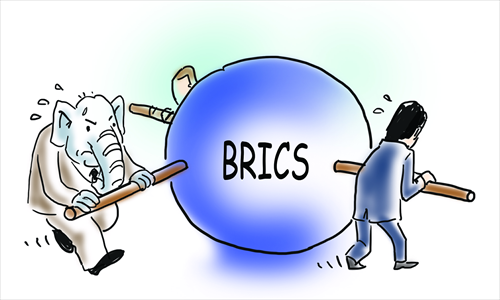India should avoid division within BRICS

Illustration: Liu Rui/GT
New Delhi officially took over the presidency of the BRICS (Brazil, Russia, India, China, and South Africa) from Moscow early this month, and will hold the 8th summit in a few months' time. India proposed to set up a development bank at the 4th BRICS summit in 2012. The New Development Bank (NDB) was established in July 2014, and officially started to operate in Shanghai last year.
The establishment of the NDB is a milestone in the institutionalization of BRICS cooperation.
Under pressure from the NDB and China-initiated Asian Infrastructure Investment Bank, the US Congress eventually approved IMF reforms in 2015, which had been dragged on for five years. The reform measures have given the BRICS bloc more say in the international financial system. Thus, India has made significant contributions to BRICS cooperation and global governance reform.
New Delhi is anticipated to make more contributions this year as the chair. However, the international political and economic environment is quite different from four years ago.
BRICS countries are facing mounting domestic and international pressure. To begin with, in contrast to the outstanding economic performances in 2012, the members are witnessing difficulties now. The economic prospect remains grim for Brazil, Russia and South Africa, which export staple commodities, for instance, energy and mineral resources, for development. Brazil and Russia are even seeing negative growth. China is struggling with its economic restructuring after entering a "new normal."
Only India is doing well. Although many scholars are suspicious of India's GDP figures, the nation's economy has expanded after Narendra Modi came into office. New Delhi is seen by some Western observers as the last "golden brick" in the BRICS bloc.
Western investors' confidence in BRICS has been dented by its poor economic performance. Last year, Goldman Sachs announced the closure of its BRIC fund.
However, BRICS and Goldman's BRIC fund have totally different purposes. BRICS is an international political and economic organization representative of emerging economies and developing nations, not an investment vehicle. Yet it is undeniable that poor economic performance will exert negative effects on BRICS' global influence, especially on the NDB's business.
In addition, BRICS nations are facing unfavorable exterior economic and geopolitical environments.
Currently, divisions in monetary policy are particularly sharp among major economies. After the Federal Reserve Board raised interest rates, emerging economies including BRICS are seeing capital outflows. Meanwhile, geopolitical competition in the Middle East and Europe, as well as rising terrorism threats, is influencing the world economy, to which BRICS is not immune.
The US attempt to write the rules has placed BRICS in a disadvantageous situation. The Trans-Pacific Partnership (TPP) was officially signed in Auckland this month, with no BRICS member yet included.
Confronted with these difficulties, the trade bloc ought to promote cooperation with other developing nations and accelerate global governance reform. The Ufa summit in 2015 put forward a blueprint to guide economic and trade cooperation among the BRICS, with the ultimate goal of achieving an integrated market, multi-tier communication, land-air-sea inter-connection and cultural exchanges.
Modi claimed that India, during its presidency, will strive to come up with responsive, inclusive, collective solutions. Modi proposed 10 steps at the Ufa conference for boosting cooperation, including a BRICS trade fair, a railway research center, audit institution cooperation, a digital initiative, an agricultural research center and a film festival. India is making concrete efforts to enhance BRICS cooperation.
Yet Modi should have come up with more constructive suggestions for global governance. India's economic growth remains the fastest among the BRICS members. As the chair of this year's summit, New Delhi should not only show its strong economic vitality, attract foreign investments, enhance its national strength, but also present itself as a major power on the multilateral occasion.
Apart from holding the pen in writing global financial system reforms and trade system construction, India should play a constructive role in regional and international affairs.
India should focus on how to improve solidarity within BRICS, especially to overcome its long-standing bias against China due to historical reasons. New Delhi believes that Beijing should reflect on why it is always misunderstood by its neighboring countries. But India also needs reflection.
India is unhappy about seeing China-centered cooperation within BRICS. As the NDB's headquarter is set in Shanghai, some Indian scholars proposed establishing a BRICS secretariat in New Delhi to guide the bank's operations. The IMF reforms and the signing of the TPP suggest that close China-India cooperation is required for the BRICS to have more say in the global financial system reforms and the international trade rules. It would be unwise for China and India to split due to ideological differences and historical issues.
The author is a senior fellow of Shanghai Institutes for International Studies and a visiting fellow of the Chongyang Institute for Financial Studies, Renmin University of China. opinion@globaltimes.com.cn